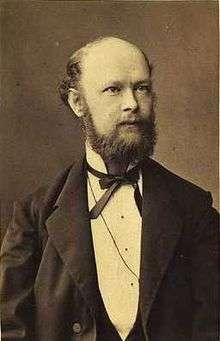Karl Verner

Karl Adolph Verner (Danish: [kɑːˀl ˈvaɐ̯ˀnɐ]; 7 March 1846, Århus – 5 November 1896, Copenhagen) was a Danish linguist. He is remembered today for Verner's law, which he stated in 1875.
Biography
Verner, whose interest in languages was stimulated by reading about the work of Rasmus Christian Rask, began his university studies in 1864. He studied Oriental, Germanic and Slavic languages, and then served in the army before resuming his studies. He travelled to Russia in December 1871, spending nearly a year learning the language. His first scientific paper was Nogle Raskiana (1874).
At the same time he began to study the accent of Danish and the Slavic languages. According to his own account, upon getting up one morning, he was puzzled by the question why the Gothic words fadar and broþar have different consonants after the root vowel. Since he was preoccupied with the study of accent at the time, he sought the explanation in that direction. This led to the formation of Verner's Law. He finished the relevant paper and sent it to Vilhelm Thomsen in 1875. Urged by Thomsen, he published it a year later.
Despite his achievement, Verner considered himself only an amateur of German philology. He declined certain offers of professorship, contenting himself to be a librarian in Halle. While spending some time at the University of Leipzig before becoming a librarian, Verner was taught by August Leskien, a pioneer of research into sound laws.[1]
With reluctance, Verner applied for the Bopp prize, which went to him in 1877. He became an extraordinary professor only in 1888, when he was also elected a member of the Royal Danish Academy of Sciences and Letters.
Notes
- ↑ Anna Morpurgo Davies, History of Linguistics, Volume IV: Nineteenth-Century Linguistics, Routledge, 2016: 9.2.
External links
| Wikisource has the text of a 1905 New International Encyclopedia article about Karl Verner. |
- Daniel Kilham Dodge's review of Verner Dahlerup's Nekrolog over Karl Verner, American Journal of Philology, The Johns Hopkins University Press, 1897. Available through JSTOR.